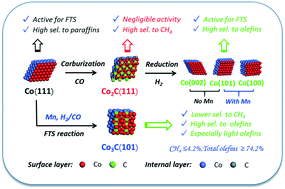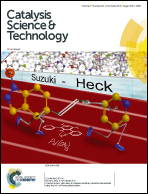Investigation of the highly tunable selectivity to linear α-olefins in Fischer–Tropsch synthesis over silica-supported Co and CoMn catalysts by carburization–reduction pretreatment†
Abstract
Herein, the evolution of metallic Co through RCR treatment and during the FTS reaction has been comparatively investigated considering the effects of a Mn promoter and varied conditions. The results show that the selectivity to α-olefins can be fine-tuned. In detail, Co3O4 (311) is always first reduced to metallic Co (111), and then, Co (111) is carburized with CO to form Co2C (111). However, second reduction over Co2C (111) results in Co (101) and Co (002) for 15Co/SiO2-RCR. Contrary to the case of unmodified 15Co/SiO2, the addition of Mn alters the evolution of Co2C (111) into Co (101) and Co (100) for 15Co3.7Mn/SiO2-RCR. During the FTS reaction over R-treated catalysts, Co (111) remains almost unchanged for 15Co/SiO2-R, but gradually evolves into Co3C (101) over 15Co3.7Mn/SiO2-R. For comparison, 15Co3.7Mn/SiO2-RCR exhibits stable Co (101) and Co (100) in the FTS reaction. The abovementioned evolutions reflect a marked effect on catalytic performance. Co (101) and Co (002) display a notable increase in selectivity to total olefins as compared to Co (111). Furthermore, a number of experiments reveal that Co3C (101) is favorable for olefins, especially for lower olefins, with a low selectivity to methane; however, Co2C (111) shows negligible activity with undesirable high selectivity to methane. Based on the comprehensive experimental data, the selectivity to total olefins might be mainly affected not only by the Co phase state and crystal facet but also by the unpaired d orbital electron number modified with Mn and the H2/CO ratio in the feed gas, directly determining the ratio of H*/C* on the catalyst surface. As an optimal result, an excellent selectivity of 74.2% to total α-olefins is obtained. In addition, α-olefin distributions can be efficiently tailored by simply changing the reaction temperature.



 Please wait while we load your content...
Please wait while we load your content...